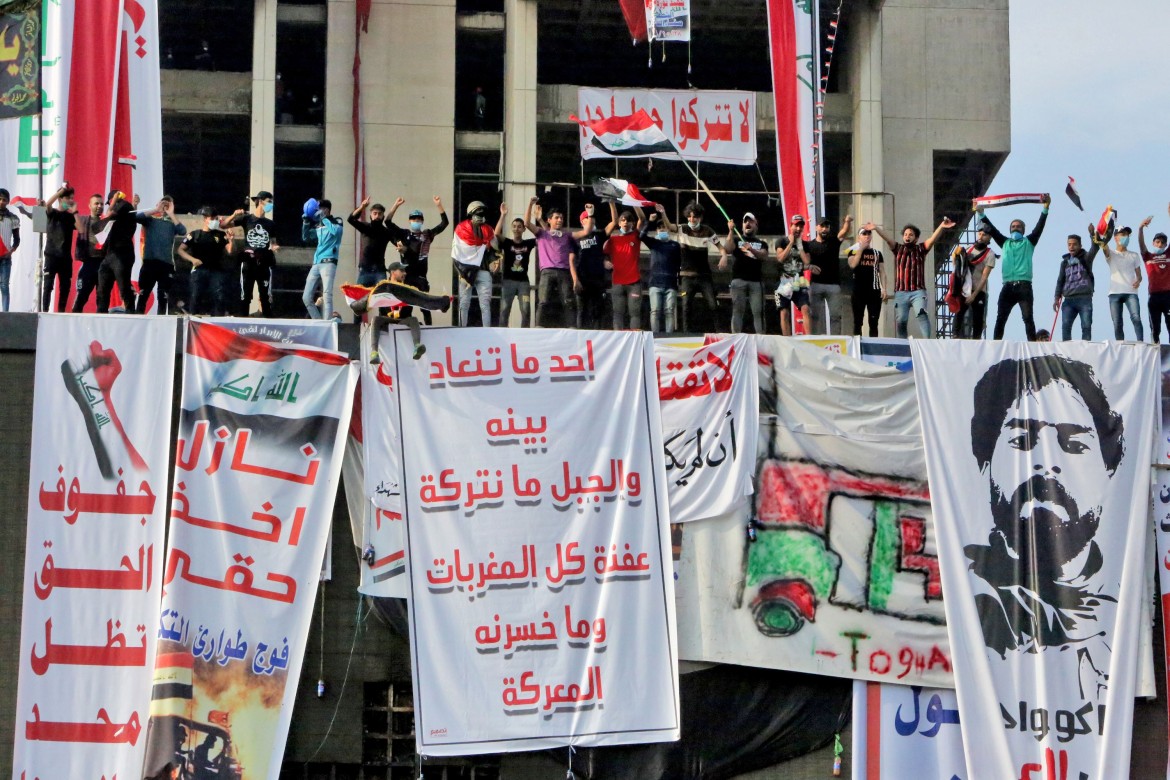Report
‘Bella Ciao’ and occupied ports, Iraqis no longer fear reprisals
Iraqis don’t want just another incarnation of the bankrupt sectarian system, but its elimination accompanied by a new, non-sectarian Constitution. Their main targets are none other than the Shiite ruling class as a whole, and its sponsor, Iran.

It looks like young Iraqis are no longer afraid of anything. Despite violent police repression (with 250 dead and 8,000 injured since the beginning of October) and armed intimidation coming from the Shiite militias, which on Tuesday carried out a terrorist attack in Karbala leaving 18 dead, the squares remain full—of people, tents, smartphones lighting up the marches during the night, and song.
During the past few days, you could hear “Bella Ciao” in Arabic in the air, sung by thousands of people—just like in Chile over the past week. It’s more than just civil disobedience: these are protest actions that are having concrete effects.
On Wednesday, the protesters blocked the port of Umm Qasr in Basra. This is the port through which wheat, vegetables, oil and sugar come into the country, which are then distributed to the whole of Iraq, for the most part dependent on foreign imports for its food. The protest forced the port to work at only 20% capacity, with port authorities warning that this may lead to an increase in prices for essential goods.
The protesters have the support of tribal leaders, who play a central role in Iraq in terms of social and political stability (something Saddam knew very well): the tribes have thrown their support behind the popular demands, and have given the government 48 hours to release the hundreds of protesters who have been arrested in Basra.
Here, in the south of the country, the protesters’ demands resonate more powerfully than anywhere else, and no one was surprised when tribal leaders supported the local protests over the past two summers over jobs: the presence of large foreign oil companies has not translated into jobs or better public services, while local farmers are forced to flee their dried-up fields because of the collapse of the levels of the Tigris and Euphrates rivers.
The religious leader Moqtada al-Sadr has also chosen to take part in the demonstrations in the Shiite south, ready as always to go on the front lines of street protests against the establishment (of which he is also a part). He has called for the resignation of Prime Minister Adel Abdul-Mahdi, whose promises of future reforms are not enough for a poor people which sees no prospect of a redistribution of wealth.
On Tuesday, al-Sadr took part in the protests in Najaf, the Shiite holy city. Announcing that he will no longer support the coalition backing Abdul-Mahdi, he has appealed to his parliamentary rivals, the al-Fatah pro-Iranian bloc led by the powerful Shiite leader of the Badr Organization, Hadi al-Amiri, to join him in ousting the prime minister. Al-Sadr wants early elections, and wants this to be agreed together with his opponents, who have already expressed their willingness to put this plan into practice.
However, Iraqis want more than that: not just another incarnation of the bankrupt sectarian system, but its elimination accompanied by a new, non-sectarian Constitution. Their main targets are none other than the Shiite ruling class as a whole, and its sponsor, Iran. These developments are causing worries in Tehran: on Wednesday, according to government sources, General Soleimani, head of the elite Quds Force of the Iranian Pasdaran, met with the Iraqi government in the Green Zone.
Also on Wednesday, the people demonstrating in Tahrir Square in Baghdad received the visit of the Special Representative of the UN Secretary-General, Jeanine Hennis-Plasschaert. “Today Iraq stands at a crossroads,” she said. “Progress through dialogue, or divisive inaction. Violence only breeds more violence. A public national dialogue can bring Iraqis together to draw a roadmap towards a more inclusive, stable and prosperous Iraq.”
The UN “continue[s] to condemn in the strongest terms the loss of life, the many injuries and the destruction of property,” said the Iraqi office of the UN in a statement, in reference to the authorities opening fire on the crowds in the capital and in the southern cities.
Pope Francis had similar words on Wednesday for “beloved Iraq”: “I invite the authorities to listen to the cry of the people who are asking for a dignified and peaceful life.”
For now, the only sign of (partial) acceptance of the demands of the protesters has come from the Supreme Judicial Council, which has announced the opening of investigations against parliamentarians accused of corruption.
Originally published at https://ilmanifesto.it/bella-ciao-e-porti-occupati-gli-iracheni-non-hanno-paura/ on 2019-10-31
